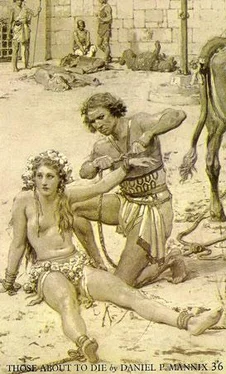Daniel Mannix - Those About to Die
Здесь есть возможность читать онлайн «Daniel Mannix - Those About to Die» весь текст электронной книги совершенно бесплатно (целиком полную версию без сокращений). В некоторых случаях можно слушать аудио, скачать через торрент в формате fb2 и присутствует краткое содержание. Год выпуска: 1972, ISBN: 1972, Издательство: Mayflower Books Ltd, Жанр: Исторические приключения, на английском языке. Описание произведения, (предисловие) а так же отзывы посетителей доступны на портале библиотеки ЛибКат.
- Название:Those About to Die
- Автор:
- Издательство:Mayflower Books Ltd
- Жанр:
- Год:1972
- ISBN:978-0583121347
- Рейтинг книги:4 / 5. Голосов: 1
-
Избранное:Добавить в избранное
- Отзывы:
-
Ваша оценка:
- 80
- 1
- 2
- 3
- 4
- 5
Those About to Die: краткое содержание, описание и аннотация
Предлагаем к чтению аннотацию, описание, краткое содержание или предисловие (зависит от того, что написал сам автор книги «Those About to Die»). Если вы не нашли необходимую информацию о книге — напишите в комментариях, мы постараемся отыскать её.
Those About to Die — читать онлайн бесплатно полную книгу (весь текст) целиком
Ниже представлен текст книги, разбитый по страницам. Система сохранения места последней прочитанной страницы, позволяет с удобством читать онлайн бесплатно книгу «Those About to Die», без необходимости каждый раз заново искать на чём Вы остановились. Поставьте закладку, и сможете в любой момент перейти на страницу, на которой закончили чтение.
Интервал:
Закладка:
Probably the most famous charioteer was a little, dark wiry fellow named Diocles. He was the first man to win a thousand races. Diocles had a passion for horses and fine clothes. He swaggered around Rome in a silk tunic and embroidered linens, and owned his own teams—which was as unusual as for a modern jockey to have a racing stable. Juvenal wrote bitterly: "Decent men groan to see this ex-slave with an income one hundred times that of a senator" but Diocles was a popular idol. He had started life as a slave-groom to a Spanish nobleman, been shipped to Rome with a cargo of horses and bought by a patrician who admired the boy's uncanny skill with temperamental thoroughbreds. He drove his first race at the age of twenty-four and, being a newcomer, was illegally forced to take the outside track. Positions were supposedly chosen by lot but there was a good deal of crookedness about the selections. To reach the rail, an outside chariot had to cut in front of the others, which meant almost certain death. Diocles didn't try it. He tailed the others until the last lap and then by a magnificent piece of driving, passed the other three chariots to win.
It was customary for the owner of a racing stable to split the purse with the charioteer, so Diocles soon made enough money to buy his freedom. He then put his winnings into buying horses, trained them himself, and got his own chariot. He usually drove stallions and collected over Ј15,000 a year for stud fees alone. In addition to his other privileges, Diocles like all famous charioteers was allowed on certain days to play April Fool-type jokes on anyone he wished, even members of the nobility.
Another lucrative source of income for Diocles was making freak runs for big side bets. Once he raced twice in one day; the first time with a six-horse hitch (swinging a six-in-hand around the ends of the Spine at full speed was a terrific feat) and won 40,000 sesterces. Then he raced a seven-horse hitch not yoked, held only with traces, and won 50,000. Perhaps his most remarkable stunt was winning a race without using a whip, for a side bet of 30,000 sesterces. The whip was used by the charioteers not so much to beat the teams as to guide them on the turns. While rounding the cones at the end of the Spine at full speed, the charioteer could signal the inside horse when to turn by laying his whip on its shoulder, and if one of the other horses tried to turn too soon, the driver could check him by a light flick. The reins were tied around the charioteers' waist so he could get more leverage on the turns but this made it difficult to control any individual horse. The horses were extremely valuable, worth far more than slaves. Training started when the horses were three years old and was so detailed that a horse could not be raced until he was five. Some teams were so smart that they could drive themselves. One driver fell out when his team made the usual "jackrabbit" start from the stalls but the horses kept going and actually won the race. They got the prize, too. Sculptors made statues of famous horses, some of which still remain. Under the statues are inscriptions such as: "Tuscus, driven by Fortunatus of the Blues, 386 wins " and "Victor, driven by Gulta of the Greens, 429 wins." Lucius Veres had a horse named Volucris who was awarded a bushel of gold pieces after a race, and the Emperor Hadrian put up a mausoleum for his horse, Borysthenes, that still stands. The most famous of these horses was Incitatus, belonging to the Emperor Caligula. Incitatus had a marble bedroom, an ivory manger and drank from a golden bucket. Famous artists decorated the walls of his stall, and he attended state dinners where his oats and corn were served to him by his special slaves. Caligula even planned to have him made a consul.
A horse that had won over one hundred races was called a Centenarius and wore a special harness. Diocles owned nine Centenarii, all of which he had trained himself. He had one horse that had won over two hundred races. This horse, named Passerinus, was so revered that soldiers patroled the streets when he was sleeping to keep people from making any noise. The best horse in the team was always on the near hand (left side) of the hitch and never yoked—only held by traces. On the turns, this horse was nearest to the Spine and his speed and sure-footedness meant the difference between life and death to the driver. The second best horse was on the offside (right) of the hitch and was usually not yoked either. On the turns, he had to jerk the chariot around while the Centenarius on the inside pivoted close to the cones. The two centre horses were yoked on either side of the shaft and were mainly for pulling power although the whole team had to know their jobs.
As today, there were unending arguments about the best breeds and best farms. The horses were not shod, so the condition of their feet was crucial. The Sicilian horses were very fast but unreliable, the Iberians good only for a short course (feet too soft), and the Libyan best for a long drag. There were several breeds we do not have today; among them the Orynx, which was striped like a zebra but was apparently a domestic breed of horse.
Although there are innumerable statues of Roman charioteers in museums and although we have plenty of old records of the sport such as "Scorpus of the White Faction got first place seven times, second place twenty-nine times and third place sixty times," I haven't been able to find a detailed description of any single race. However, there are many scattered references to incidents in the races, and it is possible to imagine what a race was like. Let's picture a race during the Ludi Magni (great games) with Diocles one of the drivers.
For weeks, virtually the only topic of conversation in Rome had been the race and the betting odds. People paid huge sums for hot tips, which were usually unreliable. Seneca, the great Roman philosopher, exclaimed: "The art of conversation is dead. Can no one today talk of anything except the skill of various charioteers and the quality of their teams?" Diocles was such a heavy favourite that a senator remarked, "If Diocles loses, it will do more to upset the national economy than a major military defeat" But a few days before the race, the betting odds suddenly altered. All sorts of rumours were sweeping the city. A man had it on the authority of one of the conditores who kept the chariots greased that Diocles had been heavily bribed to throw the race. A tavern keeper had overheard two members of the Praetorian guard say that the emperor, who was backing another team, had arranged with the sponsor of the games to start the race again if Diocles was ahead. The madam of a brothel had it from one of her girls who had entertained the valet of a prominent politician that two of the opposing charioteers had sworn a sacred oath to get Diocles by catching his chariot between them and wrecking it. A man who had a cousin who knew a vet had been told that Diocles' Centenarius, Passerinus, had been doped. People hurried to the stable to taste Passerinua' dung to see if the story was true. So the odds went up and down according to the latest rumour, many of them deliberately spread by heavy bettors who were speculating on the event.
The four corporations who controlled the races were known as the White, Red, Green, and Blue, and the charioteers wore tunics of their corporation's colour like a jockey's racing silks. All Rome was divided into these four factions—in fact, our word faction originally meant a group supporting a chariot team. People wore coloured flowers, ribbons or scarfs to show which team they were backing. So devoted were the people to their faction that they often had it engraved on their tombstones: "Memmius Regulus was a good man, a devoted husband and a staunch supporter of the Reds." Nero, who always backed the Greens, had the arena sand dyed green to honour them and the Emperor Vitellius had fifty people killed because they booed the Blues.
Читать дальшеИнтервал:
Закладка:
Похожие книги на «Those About to Die»
Представляем Вашему вниманию похожие книги на «Those About to Die» списком для выбора. Мы отобрали схожую по названию и смыслу литературу в надежде предоставить читателям больше вариантов отыскать новые, интересные, ещё непрочитанные произведения.
Обсуждение, отзывы о книге «Those About to Die» и просто собственные мнения читателей. Оставьте ваши комментарии, напишите, что Вы думаете о произведении, его смысле или главных героях. Укажите что конкретно понравилось, а что нет, и почему Вы так считаете.












